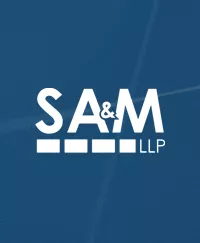Stubbs Alderton & Markiles' attorneys were featured this week in Law360 for their article entitled "The Fight For Clarity On Calif. Worker Classification Law". The featured article can be viewed on their website.
------
Since taking effect on Jan. 1, A.B. 5 has received its share of criticism and legal challenges. While the law may be well-intentioned, opponents claim it goes too far and restricts workers’ abilities to earn a living.
Steep penalties can result from noncompliance. As a result, many businesses are frustrated by the lack of guidance on how to appropriately conform to A.B. 5, especially considering the high number of exemptions and the potential for more to come.
Even for exempted professions, like freelance writers and photographers and fine artists, certain requirements must be met for said exemptions to apply. Rather than risking penalization for failing to properly conform or increasing their own costs to convert workers to employees, some businesses have opted to outsource work out of state.
These sentiments, among others, have necessitated a growing number of challenges to A.B. 5 in both California state and federal courts and the state’s Legislature. In light of these challenges, discussed in more detail below, California appears to be headed toward a series of much-needed judicial interpretations and legislative wrangling whereby the precise parameters of A.B. 5 will hopefully be clarified.
Generally, these challenges appear to signal a gradual erosion of the text of A.B. 5 as passed (i.e., more exemptions) and clear(er) guidance on how courts will interpret workers’ or public enforcement claims.
Specifically, a few of the currently unanswerable questions that will hopefully become clearer through 2020 include, but are in no way limited to:
• For purposes of qualifying under the professional services exemption, what does it mean to be "customarily engaged in the same type of work … with another hiring entity"?
• Relatedly, what exactly qualifies as a "fine artist" or "graphic design" worker?
• To apply under the business-to-business exemption, how must the hiring business demonstrate that the contracting business is free from its "control and direction"?
• Relatedly, will that phrase be interpreted the same as when applied to the referral agency exemption?
Below are brief summaries of a few of the most significant pending lawsuits challenging A.B. 5 enforcement.
Olson v. California
Two independent workers who used the Postmates and Uber applications to earn a living have filed suit in the U.S. District Court for the Central District of California claiming that A.B. 5 violates the California and U.S. Constitutions.[1] Postmates Inc. and Uber Technologies Inc. joined in the action as well.
They argue that there is no rational basis for determining the numerous professions that the bill exempts from applying the strict ABC test established by the California Supreme Court's 2018 decision in Dynamex Operations West Inc. v. Superior Court of Los Angeles County, thereby violating the equal protection clauses of the California and U.S. Constitutions. On Feb. 10, the court denied the plaintiff s’ request to halt A.B. 5’s enforcement, citing the state’s need to police misclassification as outweighing any harm to the companies and allowing the case to proceed to a determination on the merits.
California Trucking Association v. Becerra
The California Trucking Association has challenged A.B. 5 on preemption grounds in another lawsuit filed in the U.S. District Court for the Southern District of California, asserting it is inconsistent with the Federal Aviation Administration Authorization Act.[2] The suit gained steam on Jan. 16, when the court extended a previously granted temporary injunction that bars enforcement of the law on the trucking industry.
Separately, in an identical case brought by the California Trucking Association in Los Angeles Superior Court, the court there held that A.B. 5 is indeed preempted by the FAAAA on Jan. 8.[3]
American Society of Journalists and Authors Inc. v. Becerra
Freelance journalists have also challenged A.B. 5 in the U.S. District Court the Central District of California, arguing that their exemption, which allows for no more than 35 submissions per year in order to remain governed by the more flexible Borello test, violates the First Amendment.[4] In that case, the court denied injunctive relief in early January.
Proposed Legislation
While these litigation proceedings, and many others, are still working their way through the courts, California legislators have wasted no time introducing bills to upend the effects of A.B. 5. The following proposed bills, if passed, would take effect Jan. 1, 2021:
• S.B. 868 seeks to eliminate the 35-submission cap for freelance journalists and photographers, allowing all in the profession to remain independent contractors pursuant to satisfying the far less stringent Borello test regardless of how many pieces of content a freelance journalist submits to a given employer within a year.
• S.B. 867 seeks to make permanent the temporary exemption that A.B. 5 extends to newspaper distributors and carriers, which currently lasts until Jan. 1, 2021.
• S.B. 875 seeks to exempt interpreters, translators and court reporters, allowing them to remain independent contractors pursuant to passing the Borello test.
• S.B. 881 seeks to exempt persons providing services as a musician and music industry professionals, except where a collective bargaining agreement applies, also allowing them to remain independent contractors pursuant to passing the Borello test.
• A.B. 1925 would exempt small businesses, defined as independently owned and operated businesses with fewer than 100 employees and average gross receipts of $15 million or less over the previous three years, pursuant to their satisfying Borello.
• A.B. 1928 would overturn A.B. 5 in its entirety. Unlike the bills discussed above, A.B. 1928 would take immediate effect upon its passage. Specifically, A.B. 1928 seeks to reinstate Borello as the generally applicable standard for separating employees from independent contractors. However, A.B. 1928 would not nullify the Dynamex decision wherein the California Supreme Court held that the ABC test applies to claims brought under California wage order laws.
Lastly, Uber Technologies, Lyf t Inc. and DoorDash Inc. are the primary funders behind the Protect App-Based Drivers & Services Act, an initiative currently gathering signatures in order to make its way onto the November 2020 California ballot. If successful, this act would classify app-based ride-share and delivery drivers as independent contractors for all purposes, subject to meeting certain flexibility-based requirements, in exchange for minimum wage, health care, anti-discrimination, and insurance-based protections.
For now, companies should consider at least the following to ensure compliance with this new framework:
1. A.B. 5 and the ABC test presume that anyone performing a service is an employee; therefore, it is imperative to evaluate how workers are classified. Misclassification can be costly. Unless there is a recognized exemption, independent contractor status is very difficult.
2. If you are concerned that someone has been misclassified, determine what action needs to be taken to avoid being penalized. This can include reclassifying an independent contractor as an employee and providing, among other things, compensation for missed meal breaks, overtime pay, and any tax obligations or contributions to unemployment insurance.
3. The Dynamex decision could be given retroactive effect by the California Supreme Court this year, which would result in the ABC test’s application to wage order law claims going back four years. Even if Dynamex is not determined to be retroactive, the ABC test would still apply to these claims going back to the date of the Dynamex decision in April 2018. The impact that this retroactivity decision will have on A.B. 5 enforcement, which explicitly states it is not retroactive aside from applying for exemptions, remains unclear. Accordingly, classification practices over the previous four years should be evaluated to determine potential liability.
4. Review your situation if you currently or historically have classified, someone, as an independent contractor and paid them accordingly.[5]
-------------------

Jeffrey successfully litigates, arbitrates, or mediates for both plaintiffs and defendants complex business and commercial matters, whether for individuals, public or private corporations, partnerships, limited liability companies and/or its members, shareholders and partners. Jeffrey successfully handles disputes regarding contract matters, trade secrets, intellectual property (trademarks, copyrights and trade dress) negligence and fraud, employment, real estate, license agreements, the apparel and garment industry, and general business matters.
Jeffrey approaches his litigation practice from a business perspective, rather than purely transactional. In addition to representing his clients in litigation and dispute resolution matters, Jeffrey handles many of their various transactional matters relating to general business, trademarks, trade dress, copyrights and other intellectual property matters, trade secret matters, and employment matters to name a few.
Jeffrey has been directly involved in litigation and business matters for clients not only in California, but also in New York, Nevada, Texas, Arizona, London, Australia, and Estonia and other places. He litigates cases from inception through trial and in some cases appeal, directly responsible for all aspects of the prosecution, defense, and resolution of his client’s complicated and sophisticated matters in both state and federal courts. As a result of his commitment to his client’s needs, he has enjoyed long-standing client relationships.
Garett Hill is an Associate of the Firm. His practice focuses on all stages of business litigation.
Prior to joining the firm, Garett was a certified law clerk with the Re-Entry Clinic at Loyola Law School where he successfully represented Los Angeles residents seeking to expunge or seal their prior convictions or trying to obtain or restore a license that had been negatively impacted by prior convictions. Garett completed the Corporate Law Concentration at Loyola Law School where he excelled learning within the various substantive areas of business law. Additionally, Garett worked as a legal intern in-house at AECOM, where he primarily focused on corporate governance and construction law matters. He also worked as a law clerk at Girardi & Keese where he gained invaluable exposure to high-volume litigation.
The opinions expressed are those of the author(s) and do not necessarily reflect the views of the firm, its clients, or Portfolio Media Inc., or any of its or their respective affiliates. This article is for general information purposes and is not intended to be and should not be taken as legal advice.
[1] Olson v. California, 2:19-CV10956 (C.D. Cal., filed December 30, 2019).
[2] California Trucking Association v. Becerra, 3:18-CV02458 (S.D. Cal., filed Oct. 25, 2018).
[3] The People of the State of California v. Cal Cartage Transp. Express, Cal. Super. Ct. No. BC689320, order 1/8/20.
[4] American Society of Journalists and Authors, Inc. v. Becerra, 2:19-CV10645 (C.D. Cal., filed December 17, 2019).
[5] This article is not intended to be a complete recitation of the law regarding the Dynamex decision or the impacts of A.B. 5. Each business has its own unique issues and circumstances that need to be separately evaluated by an attorney



